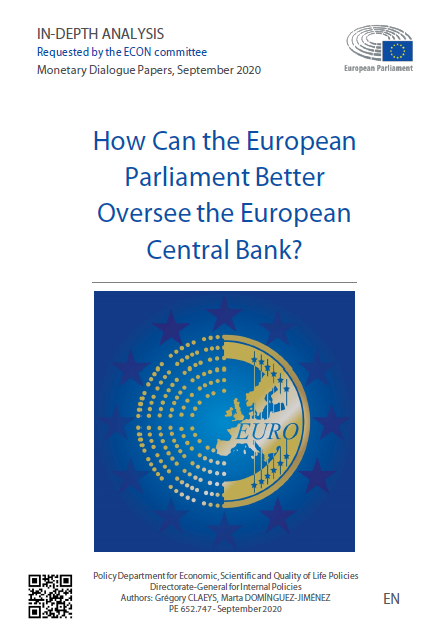External Publication
How Can the European Parliament Better Oversee the European Central Bank?
This paper, written at the request of the Committee on Economic and Monetary Affairs, assesses how the European Parliament holds the European Central Bank accountable. The same exercise is done for the Bank of Japan, in order to identify possible lessons for the ECB and the European Parliament.
This paper was prepared for the European Parliament’s Committee on Economic and Monetary Affairs (ECON) as an input to the Monetary Dialogue of 28 September 2020 between ECON and the President of the European Central Bank. The original paper is available on the European Parliament’s webpage, as part of a series of papers on “Accountability Mechanisms of Major Central Banks and Possible Avenues to Improve the ECB’s Accountability” (here). Copyright remains with the European Parliament at all times.
- In the wake of the successive crises that have affected the euro area over the last twelve years, the role of the European Central Bank (ECB) in managing the euro-area economy has expanded considerably. Its use of less-conventional monetary tools and various asset purchase programmes has increased its footprint in financial markets and in the real economy. Although we consider that this development has been warranted by the situation, it increases the need to ensure effective accountability to the European Parliament (EP), the only directly-elected EU institution.
- This paper assesses the current ECB accountability framework, and compares it to that of the Bank of Japan (BoJ). Even if the functioning and degrees of independence of the BoJ and ECB differ significantly, some useful lessons can nonetheless be drawn from the Japanese experience.
- To be more accountable, the ECB’s primary and secondary objectives should be clarified and transparency about decision-making should be increased. Moreover, in contrast to parliaments of other jurisdictions, the European Parliament’s competences are very limited: it can neither appoint nor sanction the ECB’s Executive Board members, while fundamental changes in the functioning of the ECB would require a change to the EU Treaties, which must be approved unanimously by EU Member States.
- The BoJ Act of 1997 intended to increase BoJ independence, but the BoJ remains much less independent than other major central banks, and in particular the ECB. There is a high degree of government involvement in monetary policy decisions in Japan, as “close contact” and coordination are written into law and established in practice. For instance, while the main objectives of the BoJ are enshrined in Japanese law, the quantitative definition of price stability (which evolved over time) is determined by the BoJ, but the most recent change has been heavily influenced by the government. The Japanese Parliament is also much more powerful than the EP as it can modify the law governing the functioning of the BoJ and veto appointments to the BoJ Policy Board. BoJ decision-making processes are also more transparent than those of the ECB, as the BoJ publishes detailed minutes of monetary policy meetings with details of individual votes and reasons for dissent.
- We make three main recommendations to improve the ECB accountability framework. First, the EP can, and should, improve the Monetary Dialogue, to transform it into a real hearing aimed at evaluating the ECB’s effectiveness in fulfilling its price stability mandate and in contributing to the achievement of EU objectives. The EP should also look into the proportionalityof the tools used by the ECB to fulfil its mandate in order to ensure that the ECB does not overstep its treaty-based competences. The Monetary Dialogue would also benefit from a reduction in the number of MEPs participating, to give participants the chance to engage genuinely with the ECB President and to ask follow-up questions (as is the case in Japan). The ECON Chair should also ask at each meeting a fixed set of questions related to the ECB’s performance.
- Second, the EP should push the ECB (using in particular the ongoing strategy review) to publish more detailed minutes of Governing Council meetings, which would include the votes of the members (as is the case for the BoJ), as this is legally at the discretion of the ECB. This would enable more effective scrutiny, create the right incentives at the individual level for Governing Council members, and, by allowing easier identification of the pros and cons of its policies, it would also alleviate concerns raised in some euro area countries about the proportionality of the ECB’s actions.
- Finally, amid calls for the ECB to ‘green’ its monetary policy, additional clarity on the role and ranking of secondary objectives is required. However, ranking of goals is a political task, so it should preferably be decided by elected bodies and not by unelected technocrats. The EU’s legislators should thus reveal their preferences. This clarification about the ECB’s objectives would in turn facilitate parliamentary scrutiny.









